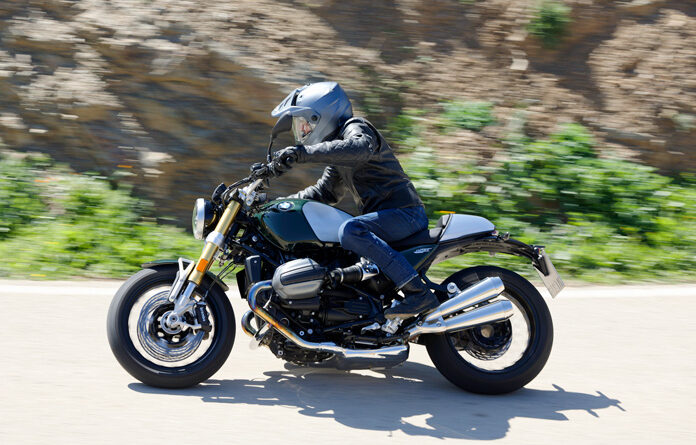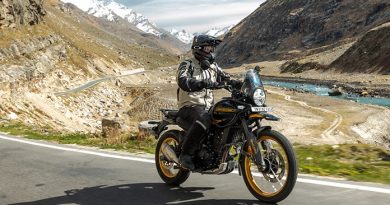2024 BMW R 12 nineT Review | First Ride
The 2024 BMW R 12 nineT is the latest addition to BMW’s storied lineup of heritage motorcycles, blending classic design elements with modern technology and performance. This classically styled roadster helps celebrate the 100th anniversary of BMW Motorrad.
The horizontally opposed twin-cylinder engine is as synonymous with BMW as V-Twins are with Harley-Davidsons. The boxer is a BMW hallmark, long known for its distinctive aesthetic and linear power delivery. A 1,170cc air/oil-cooled boxer is proudly on display in the R 12 nineT.
The R nineT was introduced in 2013, capturing the attention of riders who wanted the appearance of a vintage cafe racer but with modern performance and capabilities. More than 110,000 have been shuffled out of BMW dealers.
Related: 2023 BMW R nineT 100 Years Edition Review
For 2024, the model has changed names to include a displacement reference, the “12” added to this R 12 nineT. With a new exhaust and different tuning, the low-slung boxer produces 107 hp and is fitted into a new one-piece frame. The chassis is shared with the new R 12 cruiser ($12,345), which is detuned to 95 hp to satisfy European A2 license requirements. Both engines have identical torque curves below 6,000 rpm.
GEAR UP
Helmet: HJC DS-X1
Jacket: Alpinestars Hoxton V2
Pants: Alpinestars Copper V2
Gloves: Alpinestars GPX V2
Boots: Alpinestars Soho
BMW R 12 nineT | Equipment
The R 12 nineT starts at $16,990 including its $695 destination fee. Adding optional equipment can quickly vault MSRP. The Select Package adds $1,524 to the price and includes an up/down quickshifter, cruise control, heated grips, Hill Start Assist Pro, and Connected Ride Control with a Bluetooth interface.
Forking over another $2,275 accesses the delectable Option 719 package. It features a red frame and is capped off brilliantly by a brushed finish on the aluminum fuel tank, windscreen, rear fender, and a tail hump (a $1,020 option on its own). It also features a slathering of machined billet-aluminum components, including cylinder head covers, adjustable hand and foot controls, bar-end mirrors, and expansion-tank cover, plus a different seat and exhaust system.
But wait, there’s more! A minimalist 3.5-inch TFT instrument panel can be added for $145, but BMW wanted to give buyers the choice to opt for the newly designed twin round analog gauges, which are perhaps more appropriate for the retro-inspired nineT. Tubeless wire-spoke wheels are a $695 option to replace the standard cast-aluminum hoops, if that’s the look you prefer.
All versions of the nineT include keyless ignition, an IMU to inform traction control and cornering ABS, ride modes (Dynamic, Road, and Rain), full LED lighting, a USB-C charging port, and a 12-volt outlet.
BMW R 12 nineT | Test Ride
The assemblage of nineTs sitting in front of our Spanish hotel looked marvelous, especially with the aluminum tail humps blending with the fuel tank’s bare aluminum sides. The bikes look both classy and classic.
With a 31.3-inch seat height, the nineT is fairly easy to straddle and hold its 485-lb curb weight upright. Its 4.2-gallon tank is 1.2 inches shorter and is also narrower between the knees than it was previously to position the rider closer to the handlebar. The riding position is sporty but not punishing, a good compromise for a cafe racer such as this. The digital instrument panel fitted to our bikes is tiny but usable.
Firing up the engine is accompanied by the customary opposed-Twin twinge that rocks the bike to the right, with the new exhaust system emitting the traditional boxer blat. It’s not mellifluous but sounds somewhat authoritative.
The linear powerband avails its rider with good grunt regardless of engine speed, and it really comes alive in the midrange. Max torque of 85 lb-ft hits at 6,500 rpm, and its 107 hp peak arrives at 7,000 revs with another 1,500 rpm of rev-ability before hitting the redline at 8,500 rpm. Owners will want to burn premium-grade fuel, as I heard hints of preignition pinging when applying large throttle inputs in taller gears.
The nineT continues to use a single-plate dry clutch, which can be overwhelmed if a rider slips it excessively, and it demands a fairly heavy pull despite its hydraulic actuation. Gearbox action feels vintage compared to most modern transmissions, requiring considerable lever travel to engage the next gear. BMW’s Shift Assist Pro is available for the first time on a nineT, but it swaps gears with lurches unbecoming of a premium roadster like this. For smoothest gearchanges, I did them manually.
A wide handlebar supplies decent leverage to overcome a lazy 27.7-degree rake angle with 4.4 inches of trail and a long 59.5-inch wheelbase. As sporty as the nineT is, it’s not exceptionally agile, which made me wonder if the standard steering damper is necessary. Adding input through your feet is somewhat thwarted by slippery footpegs.
Suspension action from the fully adjustable 45mm inverted fork is excellent. The rear damper – also with 4.7 inches of travel – was reangled to perform better without a linkage and uses travel-dependent damping. The shaft-drive arrangement adds weight compared to a chain, which makes the rear end less responsive when absorbing bumps. A hydraulic preload adjuster knob is conveniently located near the rider’s right knee, while the adjustable rebound damping screw is on the shock.
When riding a debonair bike like the nineT, a rider wants to look smooth, but throttle reapplication from a closed throttle can be abrupt, and I experienced an excessive amount of engine braking during deceleration. On the plus side, the radially mounted 4-piston monoblock calipers and twin 310mm floating rotors do a fine job of shedding the levels of speed the nineT is capable of achieving.
BMW R 12 nineT | Back to the Barn
I felt conflicted about the R 12 nineT while riding it back to the hotel. It’s a special machine, no doubt, and it harks back to classic motorcycle designs with its minimalist and elegant lines. I sincerely appreciate its form factor and could imagine it sparkling in my personal garage.
On the other hand, its powertrain feels anachronistic, which came into sharp relief by riding the scintillating M 1000 XR on the same day. The nineT feels decidedly old-school, and it makes this reviewer want to paint it with the same brush as when reviewing older Moto Guzzis, highlighting the bike’s character-rich personality and overlooking its flaws.
Related: 2024 BMW M 1000 XR Review
The R 12 nineT stands out as a beautifully crafted motorcycle that pays homage to BMW’s rich heritage while incorporating modern technology. With its blend of classic aesthetics and advanced features, the nineT offers both character and capability. It won’t be the most cost-effective bike in your garage, but it might be your favorite.
2024 BMW R 12 nineT Specifications
Base Price: $16,990
Price As Tested: $20,554
Warranty: 2 yrs., unltd. miles
Website: BMWmotorcycles.com
ENGINE
Type: Air/oil-cooled, longitudinal opposed-Twin, DOHC , 4 valves per cyl.
Displacement: 1,170cc
Bore x Stroke: 101 x 73.0mm
Horsepower: 107 @ 7,000 rpm (factory claim)
Torque: 85 lb-ft @ 6,500 rpm (factory claim)
Compression Ratio: 12.0:1
Valve Insp. Interval: 6,000 miles
Fuel Delivery: EFI w/ throttle-by-wire, twin throttle bodies
Transmission: 6-speed, hydraulically actuated single-plate dry clutch
Final Drive: Paralever shaft
CHASSIS
Frame: Tubular steel
Wheelbase: 58.5 in.
Rake/Trail: 27.7 degrees/4.4 in.
Seat Height: 31.3 in.
Suspension, Front: 46mm inverted fork, fully adjustable, 4.7 in. travel
Rear: Single shock, adj. rebound damping and preload, 4.7 in. travel
Brakes, Front: Dual 310mm discs w/ 4-piston radial calipers & cornering ABS
Rear: Single 265mm disc w/ 2-piston caliper & cornering ABS
Wheels, Front: Tubeless wire-spoke, 3.5 x 17 (as tested)
Rear: Tubeless wire-spoke, 5.5 x 17 (as tested)
Tires, Front: 120/70-ZR17
Rear: 180/55-ZR17
Wet Weight: 485 lb (factory claim)
Fuel Capacity: 4.2 gal.
The post 2024 BMW R 12 nineT Review | First Ride appeared first on Rider Magazine.



